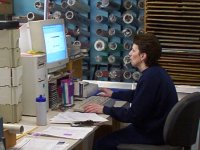 |
With today's technology, most of our artwork is done by computers. We scan your artwork and convert it into formats our specialty software and equipment can use. Our in-house artists can also assist you with creating new designs. If you send us camera ready artwork and color separations we go directly to our screen department. |
For screen printing a film positive is made of the artwork.
One is needed for every color that will be printed.
Tip:
When you have your logo or artwork printed for business cards,
ask for a copy of the artwork or color separations
(simply ask for a stat, white print or velox).
You'll then have "camera-ready" art ready
to send us.
 |
A screen then needs to be made. Fabric is stretched across a metal or wood frame. The fabric looks like your "screen door", but uses a much finer screen. The screen comes in different mesh counts (the number of screen lines per inch). The higher the screen line count per inch- the finer the fabric. The finer the fabric- the finer the lines and details that can be reproduced. Certain material colors and inks determine which number of screen lines we use. |
The fabric is coated with a light-sensitive liquid called
emulsion. When it dries the film positive is placed on the screen and exposed
to a strong light. After exposure, the film is removed and washed with a
high pressure water hose.
The emulsion washes away in the areas where your design on the film positive
was. Your logo or artwork is now a printable image on the screen. Each imprint
color has its own screen made.
After they dry, the screens are inspected for pinholes that may print but
are not part of your design and these are opaqued out. Screens can be saved
for regular repeat work or cleaned and reused again.
A variety of standard colored inks are kept on hand. Each material has an ink that it works best with. A special additive can be added to inks that puffs (raises) the design. The "puff" rises when it is exposed to the drying unit. Certain inks never air dry and must be baked (cured) in an oven. Other inks are water-based and will air-dry, but must be cured in a dryer in order to be wash-fast.
The screens are first placed and locked into the printing unit. This may be a large 10’ table, a medium sized swing arm unit or a small rotating unit. The screens can be of various sizes to accommodate your design and needs. The screens are then registered for position onto the material and also with each other for alignment for multi-colored printing. |
 |
Ink is poured into each screen. Each screen will have its
own color. A wooden handled squeegee pushes the ink through the screen's
mesh. The design is then printed onto your product. Some items such as apparel
are placed on a conveyor belt into the drying unit. When it reaches the other
end, it's dry and ready for folding and final packaging before shipping.
Some of our items, particularly signs, have to be prepared before they can be screen printed with a printable surface. We have a pressure sensitive roll machine and a heat cure machine to apply reflective and non reflective vinyl to variety of surfaces.
Smaller quantities of signs are done in vinyl pressure sensitive materials. We carry a variety of standard colors of base colors as well as art and lettering colors. |
 |
 |
Once your items are completed we ship them to you. |